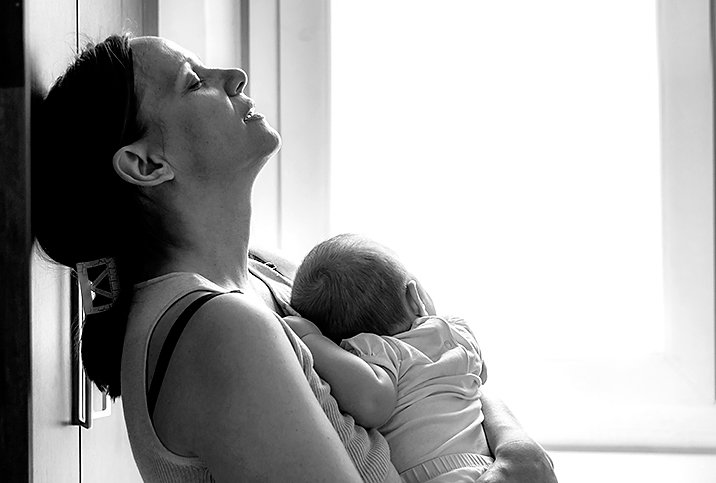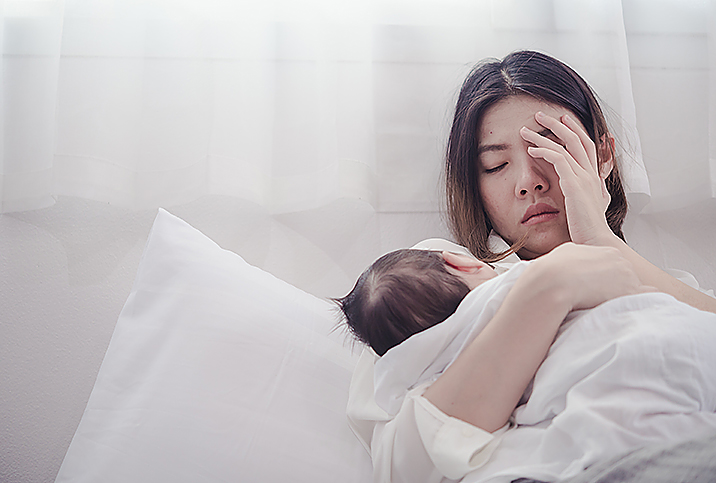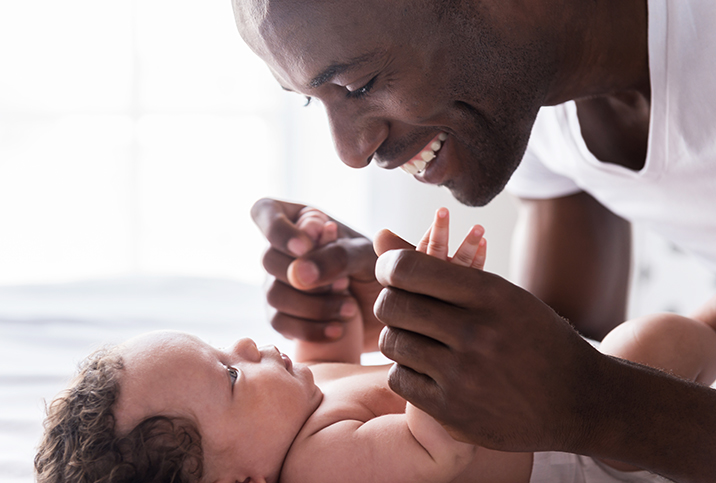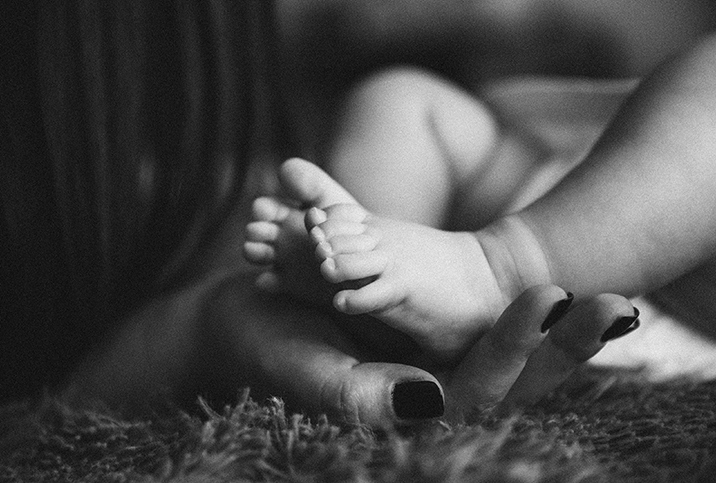Sometimes Postpartum Depression Presents Later Than Expected

When Joy, a mother of two, reached her second year of parenting with her first son, she thought she was in the clear—at least when it came to postpartum depression (PPD). She'd been on alert that it may creep up in the months after giving birth, and when it didn't she felt a sense of relief.
"I was worried about postpartum depression," she said. "I'd heard a lot about it, and my OB-GYN screened for it during every postnatal visit, and our pediatrician screened for it at my son's checkups. I never had postpartum depression."
For Joy, and many other new moms, the depression hits later than expected. "No one warned me that I might experience a mood change after weaning," Joy said. "I nursed my son for over 17 months, and it wasn't until I started weaning him that I began to see signs of depression."
The problem with screenings
Many of the mothers I spoke to for this story were quick to say that postpartum screenings are lacking at best.
"You're screened at your baby's follow-up appointments and it's this bullshit EPDS system that has you choose from 1 through 10 for various questions like, 'Have you cried in the past few days?'" Anna, a mother of one, told me. "And it's like, 'Yeah, I have. I just birthed a human, I have no idea what I'm doing, and I'm getting four hours of sleep a day."
And while it may be less than ideal, at least the conversation around postpartum depression exists. The same cannot be said for post-weaning depression (PWD), which manifests largely in the same way as PPD except for when it occurs.
This lack of information about post-weaning depression is partially because it's not a recognized diagnosis in the medical field.
"PPD affects 10 to 15 percent of all new mothers in the first months after childbirth. However, I have not seen any statistics on the incidence of PWD. Additionally, the scientific research available or conducted about PWD is extremely low," said Gunvor Ekman Ordeberg, M.D., an OB-GYN, co-founder of DeoDoc Intimate Skincare and professor of OB-GYN at Karolinska Institute.
While it may not be an official DSM diagnosis, that does not mean post-weaning depression doesn't exist. When I put out a call on Instagram looking for people in my circle who had experienced depression after moving away from breastfeeding, my inbox was flooded with a flurry of responses.
'I might have realized it earlier under different circumstances, but, unfortunately, this timing coincided with the world going into lockdown because of COVID.'
Some simply sent the hand-raised emoji, some said they wished there had been more information available to them, others mentioned how blindsided they felt just as they expected parenting and life to become a little more buoyant.
Alexis, a mother of two, said she was also on high-alert for postpartum depression and anxiety, both of which never came until she began weaning. "I very slowly weaned my daughter starting when she was 13 months old," Alexis said. "By 15 months, she was only nursing once in the morning and once at night. At 16 months, we dropped her evening nursing session, and right at 17 months, she decided to stop nursing altogether.
"I remember beginning to notice signs of depression within days of dropping her night feeding, but I wasn't sure that it was PWD until a week or two after she had weaned completely, six weeks later," Alexis continued. "I might have realized it earlier under different circumstances, but, unfortunately, this timing coincided with the world going into lockdown because of COVID. It was hard to figure out what feelings were tied to COVID-related anxiety and which were the result of fluctuating hormones from weaning."
Joy, who actually wrote an article on this very topic, said symptoms she experienced post-weaning included feelings of helplessness and dread, trouble concentrating and completing tasks, weight gain, brain fog and bouts of crying. "If there was even a small chance that I'd experience depression after weaning, why had I not been warned?" she asked.
What causes feelings of depression after weaning?
"As joyful as it is to have a new baby, the combination of the physical experience of childbirth, the dramatic hormonal shifts, sleep disruption, and the social and emotional role changes associated with becoming a mother are massively stressful," explained Elizabeth LaRusso, M.D., a perinatal and reproductive psychiatrist at Allina Health's Abbott Northwestern Hospital in Minneapolis, Minnesota.
"Some women navigate these transitions with relative ease, but many women, particularly those with risk factors for postpartum depression (e.g., personal or family history of depression, untreated depression during pregnancy, poor social support), have more difficulty and are at increased risk for developing PPD," LaRusso said.
She adds that these same factors influence the development of PWD, "particularly fluctuations in estrogen and the abrupt decreases in progesterone and oxytocin associated with stopping breastfeeding." Oxytocin, the "love hormone," is released during sex and cuddling but also during breastfeeding, and it promotes feelings of love and bondedness. When levels of the hormone drop off abruptly, it can promote feelings of depression.
Emotional and psychological factors can also impact the development of PWD, "as many women experience a sense of sadness or loss associated with stopping breastfeeding, particularly if they are stopping earlier than they had hoped or planned," LaRusso said.
There's also a lack of support and conversation surrounding weaning, especially for a topic that is talked about so relentlessly at its onset. "Why did nobody talk about the ending? Where did all my support go?" Alexis asked.
What are the signs of PPD/PWD?
As much as 80 percent of mothers will experience the "baby blues" after giving birth, said Paul Poulakos, M.D., a board-certified psychiatrist in Greenwich Village, New York.
"Unlike the baby blues, in which a new mother may find herself dealing with emotional changes, typically resolving within the first two weeks following pregnancy, women struggling with PPD experience depressive symptoms that interfere with their ability to take care of themselves and/or their babies," Poulakos explained. "These feelings often persist for longer than three weeks and require treatment."
Kecia Gaither, M.D., F.A.C.O.G., double board-certified in OB-GYN and Maternal-Fetal Medicine, and director of Perinatal Services at NYC Health + Hospitals/Lincoln in the Bronx, said that signs of PPD (and, by extension, PWD) include:
- Feeling sad
- Difficulty sleeping
- Feeling worthless, hopeless or guilty
- Unexplained weight loss or gain
- Not feeling attached to the baby/showing little interest in the baby
- Loss of appetite
- Frequent crying or tearfulness
- Feeling restless, irritable or anxious
"Anxiety, although less well studied in perinatal populations, frequently goes hand in hand with depression. Mothers who experience severe anxiety, worry or panic that it interferes with their ability to sleep, care for their infant or be alone may be experiencing a postpartum anxiety disorder," LaRusso said, adding that if someone is experiencing thoughts of harming herself or her baby, she should be brought to her physician or an emergency room for immediate evaluation.
What can be done about post-weaning depression?
It may be a cold comfort in periods of intense lows, but women experiencing PWD can try to remember it's a temporary state largely brought on by hormonal fluctuations that are out of their control. And, unfortunately, it can be hard to avoid. "I wish I knew that no matter how hard I tried to avoid PWD (very slowly weaning, replacing feeds with cuddles, getting extra exercise and more sleep, etc.), it could and would still rock my world," Alexis said.
Unfortunately, receiving a proper diagnosis may prove to be challenging as well. "Reaching a diagnosis for PPD or PWD can be a bit complicated as symptoms may be confused for common post-pregnancy sleep deprivation, like fatigue and decreased energy," Ekman Ordeberg said.
When someone is experiencing depression it can feel near impossible to advocate for themselves, which is part of the reason why it's so helpful to have a support system in place who can help you.
"The most important thing that any woman struggling during pregnancy or the postpartum period can do is speak up and reach out to the people she trusts," LaRusso said. "Letting family or friends know about mood and anxiety symptoms is the first step in increasing support and getting a plan in place to obtain further evaluation and treatment."
LaRusso advises women to contact their doctor to schedule an appointment to discuss the next steps. "Other organizations, such as Postpartum Support International, offer information and resources to help connect women to appropriate care," she added.
Through a combination of therapy, meditation, exercise and deleting social media accounts that made her feel inadequate, Joy's post-weaning depression began to lift. It was not an issue after weaning with her second child. In some cases it may take a combination of antidepressants (SSRIs) in conjunction with psychotherapy, Poulakos said.
Even in the throes of post-weaning depression, it can be helpful to be reminded that you can ask for help, and you are most certainly not alone, even if the official DSM diagnosis does not exist. Just ask the mothers filling up my inbox.


















